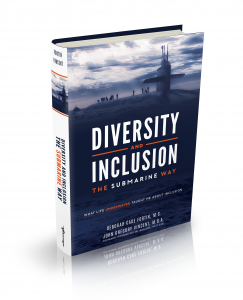Oversimplifying Effective Community Policing Will Not Produce The Needed Results
The Submarine Way is putting all the pieces together with a diverse coalition of community leaders, D, E & I experts, and police to solve this critical issue.
What can be done to improve the community and police relationships?
It was recommended that police become familiar with the community, including socio-economic areas and needs, view individuals as clients, and not victims and suspects. Police should withhold judgment and treat people as humans, fallible but still human. The people who sit on the hill taking communion in the morning should be respected, just as the people who live in the big house on the hill. Both could be important in keeping the community safe. The community could recognize that police do not clock out after their workday like many others. They work for the community if needed 24/7/365.
What are some specific steps for improving police/community relations?
Both community and police need to be engaged in building relationships and trust. Police can hold a citizen’s police academy to introduce the average citizen into the training and life of a police officer. City Council members can visit local churches and hear directly from citizens their questions and concerns about police. They can also learn about police initiatives that impact the community. Other trust brokers from the community, the mayor, civic leaders, or others can begin the dialogue with the police. When trouble happens, trust is already established. Do not expect trust during tough times if it is not already anchored in the relationship already. Police are trained to value, not judge, and to develop interdependent collaboration with the community and each other. Police also are taught to protect themselves. The danger is expected and to not be prepared for it, while also simultaneously not expecting it, make police vulnerable.
How can community policing be trained in police departments?
A talent and strength-based view can be taught to police, aimed first at building internal relationships within the police department, then aimed at helping police understand the strengths of the community. Talent sets that work well at liaising with the community will be identified. Police coalitions can be built that include D&I officers, mayors, city managers, or city councils. These are based on the strengths of individuals to build relationships and trust. Once these first steps happen, leadership courses happen that encourage interdependent collaboration with the community and each other. Courses on conflict resolution, peer and self-regulation, community relations, and accountability round out the curriculum.
This community policing coalition agrees that change evolves over time, that culture changes over time with commitment, education, and a clear mission.
Deborah Cake Fortin
The Submarine Way
+1 843-617-9191
email us here
Visit us on social media:
Facebook
Twitter
LinkedIn
Legal Disclaimer:
EIN Presswire provides this news content "as is" without warranty of any kind. We do not accept any responsibility or liability for the accuracy, content, images, videos, licenses, completeness, legality, or reliability of the information contained in this article. If you have any complaints or copyright issues related to this article, kindly contact the author above.


